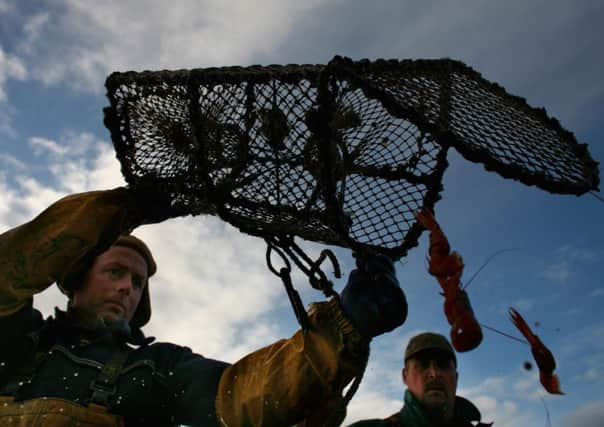Landing all catches is a recipe for disaster


Fishermen from Scottish ports who go to sea in all weathers to catch haddock, cod, saithe, whiting and nephrops face an enormous challenge to their livelihoods from January 2016.
Following a successful campaign by environmental non-governmental organisations (NGOs) and some of their celebrity friends in the catering trade, reforms to the European Union Common Fisheries Policy (CFP) mean that a ban on discarding fish at sea – known as the landings obligation – will come into force from that date.
Advertisement
Hide AdAdvertisement
Hide AdLet me state categorically that nobody, least of all fishermen, wants to see healthy fish being thrown back into the sea.
As the country’s largest fishing association, the Scottish White Fish Producers’ Association (SWFPA), which I lead, has publicly declared its backing for long-overdue reforms to the CFP.
However, the aims of a policy and the practical implementation of measures designed to achieve those aims are two very different things.
To put it bluntly, maintaining an economically viable fleet will be hugely difficult – if not impossible – if the discard ban comes in without other major changes to the management regime. The obligation to land all catches is at best less than ideal and at worst a recipe for disaster.
Whereas some parts of fleets will survive, it is clear that for others the discard ban will mean the loss of their business, resulting in significant consolidation.
A move in emphasis away from landings to catches provides real potential for fishing businesses to prosper. But it is imperative that the issues in the way are identified early and tackled head on to ensure a future for the industry around our shores.
In the SWFPA’s official response to the European Commission consultation on technical measures in the reformed CFP, I have identified the key issues as:
• Choke species – types of fish that are abundant but have low quotas which in a mixed fishery are quickly exhausted, preventing further fishing for the main target species.
Advertisement
Hide AdAdvertisement
Hide Ad• A command and control approach from the European Commission on technical measures which contradicts the move to regional management in the reformed CFP.
• Failure of the derogations in the reformed CFP to provide a “soft landing” for the discard ban to give time for it to be implemented satisfactorily.
The west of Scotland cod fishery is one example where, if the current quota was caught and landed, it would severely restrict the amount of monkfish – usually brought up in the same net – that could be caught. In fact, it would probably restrict the amount of high-value monkfish caught to around one fifth of its present level.
There are many other fisheries which would suffer in a similar fashion, making fishing uneconomical for many boats.
It is beyond reason, therefore, to expect simultaneous delivery of economic viability, maximum sustainable yield (MSY) harvesting and the landings obligation.
The SWFPA’s members want the European Commission to abandon its prescriptive approach to regulating the mechanics of fishing.
Paternalism and top down management have no place in output-focused management. It would be supremely duplicitous to hand the reins of responsibility to fishers, then to prescribe how they should make the best fit; it is very much at odds with a move to regional management.
The SWFPA agrees with the North Sea Advisory Council, which has said that “in terms of presenting technical measures, it is time for the Commission, Council of Ministers and European Parliament to leave the stage”.
Advertisement
Hide AdAdvertisement
Hide AdWhat should be avoided is any prescriptiveness with regard to net characteristics, reference gears or set limits on species mix.
We also need to see the complete abandonment of limits on days at sea and the one net rule.
Scottish fisheries minister Richard Lochhead has recognised that an abundance of fish out of step with the quota available for that fish can create a “real headache” for Scottish fishermen. To be able to resolve this problem, as he says, we are going to have to work with Europe to find a solution.
Indeed, we are going to have to work with Europe to find solutions to all the obstacles that stand in the way of successful implementation of the landings obligation.
We have a clear responsibility to protect our members’ businesses. Where possible, this should be through the delivery of a workable management structure, which means the necessary operational freedom including access to suitable fishing opportunities. We have to be equally aware, however, that our members also want us to protect the value of their assets. In some cases this may mean a structured exit from the industry.
With just 18 months to go, time is not on our side. We need to start grappling with these issues now. Otherwise it will be too late for the fishermen who bring jobs to our communities, quality produce to our markets and value to our economy.
• Mike Park is chief executive of the Scottish White Fish Producers’ Association. The SWFPA represents 200 boats and 1,200 fishermen operating across a wide range of gear types, target species and management areas.
SEE ALSO